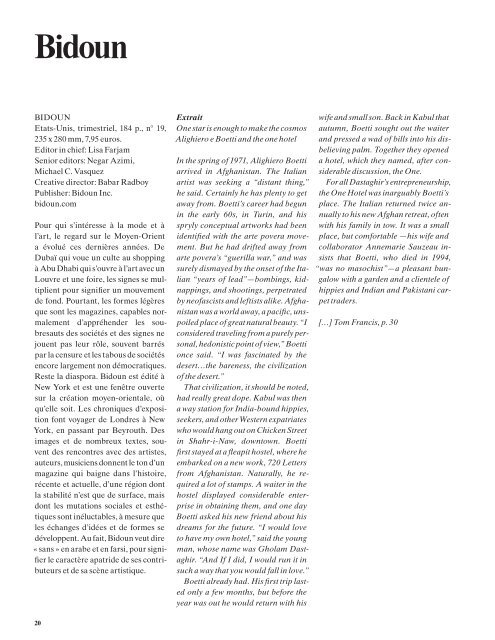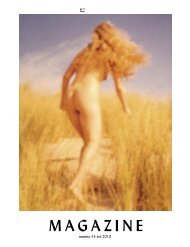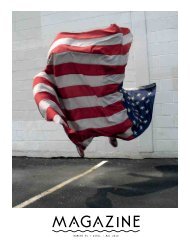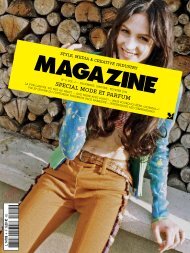You also want an ePaper? Increase the reach of your titles
YUMPU automatically turns print PDFs into web optimized ePapers that Google loves.
Bidoun<br />
Bidoun<br />
Etats-Unis, trimestriel, 184 p., n° 19,<br />
235 x 280 mm, 7,95 euros.<br />
Editor in chief: Lisa Farjam<br />
Senior editors: Negar Azimi,<br />
Michael C. Vasquez<br />
Creative director: Babar Radboy<br />
Publisher: Bidoun Inc.<br />
bidoun.com<br />
Pour qui s’intéresse à la mode et à<br />
l’art, le regard sur le Moyen-Orient<br />
a évolué ces dernières années. De<br />
Dubaï qui voue un culte au shopping<br />
à Abu Dhabi qui s’ouvre à l’art avec un<br />
Louvre et une foire, les signes se multiplient<br />
pour signifier un mouvement<br />
de fond. Pourtant, les formes légères<br />
que sont les magazines, capables normalement<br />
d’appréhender les soubresauts<br />
des sociétés et des signes ne<br />
jouent pas leur rôle, souvent barrés<br />
par la censure et les tabous de sociétés<br />
encore largement non démocratiques.<br />
Reste la diaspora. Bidoun est édité à<br />
New York et est une fenêtre ouverte<br />
sur la création moyen-orientale, où<br />
qu’elle soit. Les chroniques d’exposition<br />
font voyager de Londres à New<br />
York, en passant par Beyrouth. Des<br />
images et de nombreux textes, souvent<br />
des rencontres avec des artistes,<br />
auteurs, musiciens donnent le ton d’un<br />
magazine qui baigne dans l’histoire,<br />
récente et actuelle, d’une région dont<br />
la stabilité n’est que de surface, mais<br />
dont les mutations sociales et esthétiques<br />
sont inéluctables, à mesure que<br />
les échanges d’idées et de formes se<br />
développent. Au fait, Bidoun veut dire<br />
« sans » en arabe et en farsi, pour signifier<br />
le caractère apatride de ses contributeurs<br />
et de sa scène artistique.<br />
Extrait<br />
One star is enough to make the cosmos<br />
Alighiero e Boetti and the one hotel<br />
In the spring of 1971, Alighiero Boetti<br />
arrived in Afghanistan. The Italian<br />
artist was seeking a “distant thing,”<br />
he said. Certainly he has plenty to get<br />
away from. Boetti’s career had begun<br />
in the early 60s, in Turin, and his<br />
spryly conceptual artworks had been<br />
identified with the arte povera movement.<br />
But he had drifted away from<br />
arte povera’s “guerilla war,” and was<br />
surely dismayed by the onset of the Italian<br />
“years of lead”—bombings, kidnappings,<br />
and shootings, perpetrated<br />
by neofascists and leftists alike. Afghanistan<br />
was a world away, a pacific, unspoiled<br />
place of great natural beauty. “I<br />
considered traveling from a purely personal,<br />
hedonistic point of view,” Boetti<br />
once said. “I was fascinated by the<br />
desert…the bareness, the civilization<br />
of the desert.”<br />
That civilization, it should be noted,<br />
had really great dope. Kabul was then<br />
a way station for India-bound hippies,<br />
seekers, and other Western expatriates<br />
who would hang out on Chicken Street<br />
in Shahr-i-Naw, downtown. Boetti<br />
first stayed at a fleapit hostel, where he<br />
embarked on a new work, 720 Letters<br />
from Afghanistan. Naturally, he required<br />
a lot of stamps. A waiter in the<br />
hostel displayed considerable enterprise<br />
in obtaining them, and one day<br />
Boetti asked his new friend about his<br />
dreams for the future. “I would love<br />
to have my own hotel,” said the young<br />
man, whose name was Gholam Dastaghir.<br />
“And If I did, I would run it in<br />
such a way that you would fall in love.”<br />
Boetti already had. His first trip lasted<br />
only a few months, but before the<br />
year was out he would return with his<br />
wife and small son. Back in Kabul that<br />
autumn, Boetti sought out the waiter<br />
and pressed a wad of bills into his disbelieving<br />
palm. Together they opened<br />
a hotel, which they named, after considerable<br />
discussion, the One.<br />
For all Dastaghir’s entrepreneurship,<br />
the One Hotel was inarguably Boetti’s<br />
place. The Italian returned twice annually<br />
to his new Afghan retreat, often<br />
with his family in tow. It was a small<br />
place, but comfortable —his wife and<br />
collaborator Annemarie Sauzeau insists<br />
that Boetti, who died in 1994,<br />
“was no masochist”—a pleasant bungalow<br />
with a garden and a clientele of<br />
hippies and Indian and Pakistani carpet<br />
traders.<br />
[…] Tom Francis, p. 30<br />
20 21











